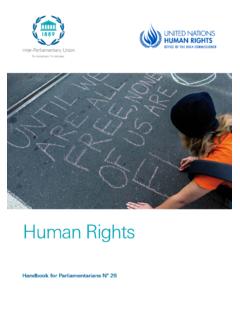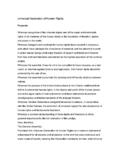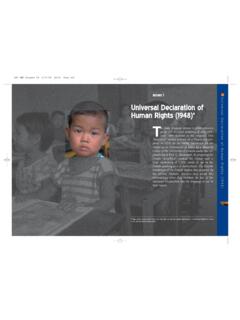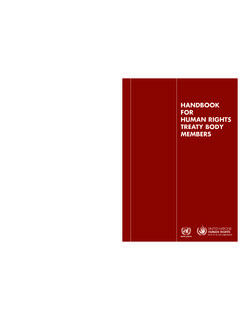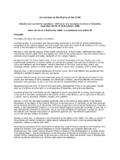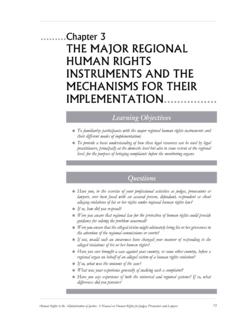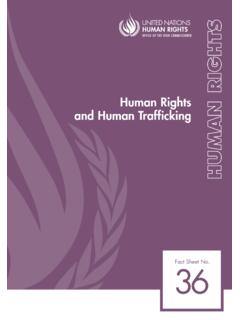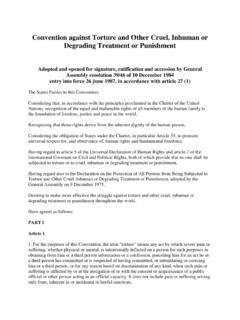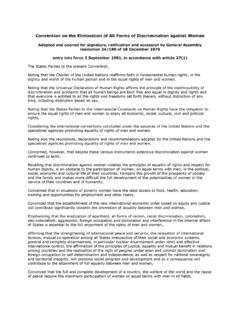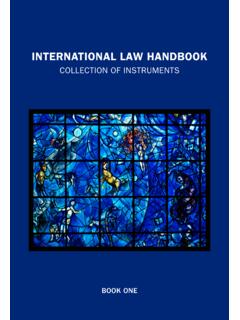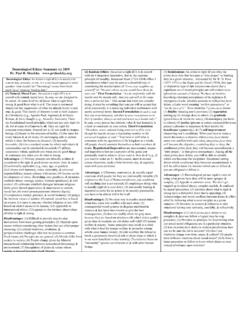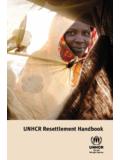Transcription of LEGALLY BINDING INSTRUMENT TO REGULATE, IN …
1 1 OEIGWG CHAIRMANSHIP THIRD REVISED DRAFT LEGALLY BINDING INSTRUMENT TO REGULATE, IN international HUMAN rights LAW, THE ACTIVITIES OF TRANSNATIONAL CORPORATIONS AND OTHER BUSINESS ENTERPRISES Preamble SECTION I Article 1. Definitions Article 2. Statement of Purpose Article 3. Scope SECTION II Article 4. rights of Victims Article 5. Protection of Victims Article 6. Prevention Article 7. Access to Remedy Article 8. Legal Liability Article 9. Adjudicative Jurisdiction Article 10. Statute of Limitations Article 11. Applicable Law Article 12. Mutual Legal Assistance and international Judicial Cooperation Article 13.
2 international Cooperation Article 14. Consistency with international Law Principles and Instruments SECTION III Article 15. Institutional Arrangements Article 16. Implementation Article 17. Relations with Protocols Article 18. Settlement of Disputes Article 19. Signature, Ratification, Acceptance, Approval and Accession Article 20. Entry into Force Article 21. Amendments Article 22. Reservations Article 23. Denunciation Article 24. Depositary and Languages 2 Preamble The States Parties to this ( LEGALLY BINDING INSTRUMENT ), (PP1) Reaffirming the principles and purposes of the Charter of the United Nations; (PP2) Recalling the nine core international Human rights Instruments adopted by the United Nations, and the eight fundamental Conventions adopted by the international Labour Organization.
3 (PP3) Recalling also the Universal Declaration of Human rights , as well as the Declaration on the Right to Development, the Vienna Declaration and Programme of Action, the Durban Declaration and Programme of Action, the UN Declaration on Human rights Defenders, the UN Declaration on the rights of Indigenous Peoples, relevant ILO Conventions, and recalling further the 2030 Agenda for Sustainable Development, as well as all internationally agreed human rights Declarations; (PP4) Reaffirming the fundamental human rights and the dignity and worth of the human person, in the equal rights of men and women and the need to promote social progress and better standards of life in larger freedom while respecting the obligations arising from treaties and other sources of international law as set out in the Charter of the United Nations; (PP5) Reaffirming that all human rights are universal, indivisible, interdependent, inter-related, and inalienable, and should be applied in a non-discriminatory way.
4 (PP6) Upholding the right of every person to have effective and equal access to justice and remedy in case of violations of international human rights law or international humanitarian law, including the rights to non-discrimination, participation and inclusion; (PP7) Stressing that the primary obligation to respect, protect, fulfill and promote human rights and fundamental freedoms lie with the State, and that States must protect against human rights abuse by third parties, including business enterprises, within their territory, jurisdiction, or otherwise under their control, and ensure respect for and implementation of international human rights law.
5 (PP8) Recalling the United Nations Charter Articles 55 and 56 on international cooperation, including in particular with regard to universal respect for, and observance of, human rights and fundamental freedoms for all without distinction of race, colour, sex, language or religion; (PP9) Upholding the principles of sovereign equality, peaceful settlement of disputes, and maintenance of the territorial integrity and political independence of States as set out in Article 2 of the United Nations Charter; (PP10) Acknowledging that all business enterprises have the capacity to foster sustainable development through an increased productivity, inclusive economic growth and job creation that respect internationally recognized human rights , labour rights , health and safety standards, the environment and climate, in accordance with relevant international standards and agreements.
6 3 (PP11) Underlining that business enterprises, regardless of their size, sector, location, operational context, ownership and structure have the obligation to respect internationally recognized human rights , including by avoiding causing or contributing to human rights abuses through their own activities and addressing such abuses when they occur, as well as by preventing or mitigating human rights abuses that are directly linked to their operations, products or services by their business relationships; (PP12) Emphasizing that civil society actors including human rights defenders have an important and legitimate role in promoting the respect of human rights by business enterprises, and in preventing, mitigating and seeking effective remedy for business-related human rights abuses.
7 (PP13) Recognizing the distinctive and disproportionate impact of business-related human rights abuses on women and girls, children, indigenous peoples, persons with disabilities, people of African descent, older persons, migrants and refugees, and other persons in vulnerable situation, as well as the need for a business and human rights perspective that takes into account specific circumstances and vulnerabilities of different rights -holders and the structural obstacles for obtaining remedies for these persons; (PP14) Emphasizing the need for States and business enterprises to integrate a gender perspective in all their measures, in line with the Convention on the Elimination of All Forms of Discrimination against Women, the Beijing Declaration and Platform for Action, the ILO Convention 190 concerning the elimination of violence and harassment in the world of work, the Gender Guidance for the Guiding Principles on Business and Human rights , and other relevant international standards.
8 (PP15) Taking into account the work undertaken by the United Nations Commission on Human rights and the Human rights Council on the question of the responsibilities of transnational corporations and other business enterprises with respect to human rights , and all relevant previous Human rights Council resolutions, including in particular Resolution 26/9; (PP16) Recognizing the contribution and complementary role that the Guiding Principles on Business and Human rights : Implementing the United Nations Protect, Respect and Remedy Framework has played in that regard and to advancing respect for human rights in the business activities; (PP17) Noting the ILO Declaration on Fundamental Principles and rights at Work and the Tripartite Declaration of Principles concerning Multinational Enterprises and Social Policy.
9 (PP18) Desiring to clarify and facilitate effective implementation of the obligations of States regarding business-related human rights abuses and the obligations of business enterprises in that regard; Have agreed as follows: 4 SECTION I Article 1. Definitions Victim shall mean any person or group of persons, irrespective of nationality or place of domicile, who individually or collectively have suffered harm that constitute human rights abuse, through acts or omissions in the context of business activities. The term victim may also include the immediate family members or dependents of the direct victim.
10 A person shall be considered a victim regardless of whether the perpetrator of the human rights abuse is identified, apprehended, prosecuted, or convicted. Human rights abuse shall mean any direct or indirect harm in the context of business activities, through acts or omissions, against any person or group of persons, that impedes the full enjoyment of internationally recognized human rights and fundamental freedoms, including the right to a safe, clean, healthy and sustainable environment. Business activities means any economic or other activity, including but not limited to the manufacturing, production, transportation, distribution, commercialization, marketing and retailing of goods and services, undertaken by a natural or legal person, including State-owned enterprises, financial institutions and investment funds, transnational corporations, other business enterprises, joint ventures, and any other business relationship undertaken by a natural or legal person.
